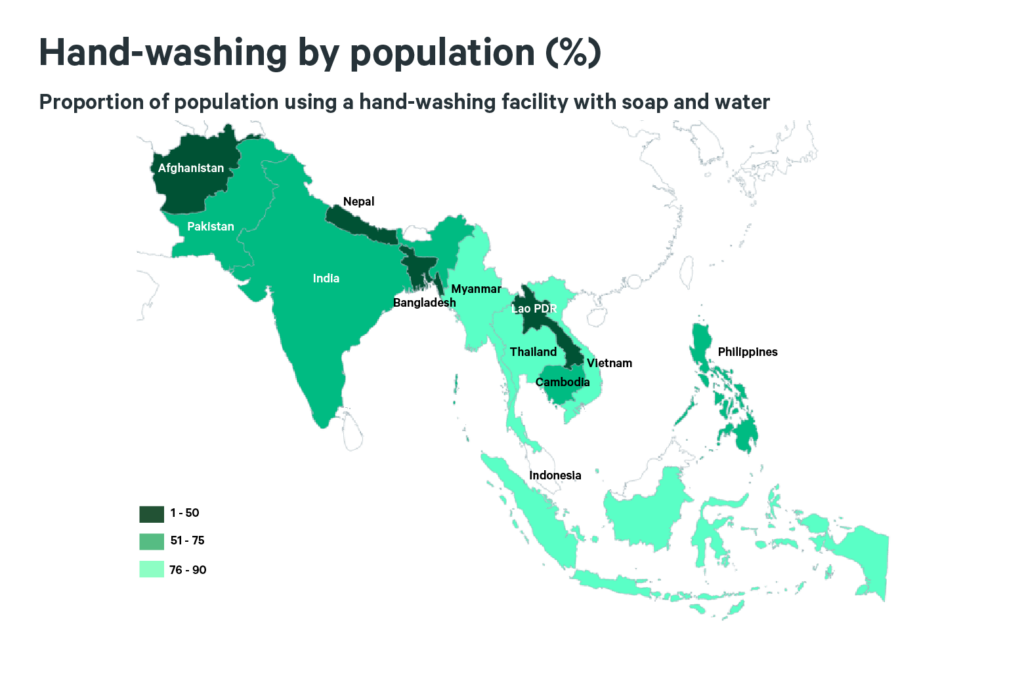- Forum
- categories
- Health and hygiene, schools and other non-household settings
- Health issues and connections with sanitation
- COVID-19 - Corona virus pandemic in relationship to WASH
- Coronavirus - Hand hygiene where there is no running tap water - and is handwashing with ash effective to prevent COVID-19?
Coronavirus - Hand hygiene where there is no running tap water - and is handwashing with ash effective to prevent COVID-19?
6885 views
- jindal1965
-

- User
Less- Likes received: 1
Re: Coronavirus - Hand hygiene where there is no running tap water - and is handwashing with ash effective to prevent COVID-19?
Handwashing with ash or soil is traditional in impoverished or remote communities that do not have easy access to soap. Are those methods effective at preventing the spread of the novel coronavirus? The question arose in an email discussion among members of the
Rural Water Supply Network
. Experts weighed in from around the world, and the short answer appears to be “probably.”
The accurate answer, of course, is that there is not enough evidence to make a claim. But research on handwashing with soil and ash exists, and it may be possible to infer the efficacy of those materials against coronavirus from studies that never examined the virus specifically. There is precedent for that kind of guesswork. Before studies were available on the efficacy of masks, for example, health experts were recommending them based on research into other diseases. Eventually, studies on COVID-19 proved the validity of the recommendations.
OFFICIAL WASH GUIDELINESThe joint WHO-UNICEF WASH technical brief on water, sanitation, hygiene and waste management for COVID-19 issues a recommendation for handwashing.
Frequent and correct hand hygiene is one of the most important measures to prevent infection with the COVID-19 virus. WASH practitioners should work to enable more frequent and regular hand hygiene by improving access to hand hygiene facilities and using multimodal approaches…
And, in the absence of soap, a WHO brief offering interim guidance on WASH for COVID-19 management recommends ash, soil or water alone.
When soap or alcohol-based hand rub are not available, the use of ash or soil can be considered and has shown to be effective in some cases. Ash, in particular, may inactivate pathogens by raising the pH. However, in communities with limited sanitation services, soil may be faecally contaminated, and thus it is important to weigh the benefits against the risk of contaminating hands. Finally, washing with water alone, although the least effective of the four options, this can result in reductions in faecal contamination on hands and in diarrhoea. Regardless of the type of material, the washing and rubbing of hands, and the amount of rinsing water in particular, are important determinants in the reduction of pathogen contamination on hands.
Rinsing and the action of rubbing the hands together while washing appear to be as important or more so than the material used to clean the hands. So long as the handwashing material is not contaminated, of course.
WHAT THE RESEARCH SUGGESTSWriting in the RWSN discussion, Emma Kelly, Communications and Knowledge Management Specialist at the University of North Carolina Water Institute, cites four studies that inform the recommendation for ash or (disinfected) soil.
Anuradha and colleagues published a study based in India in 1999 in the Indian Journal of Pediatrics in which they swabbed children’s hands for bacteria before and after washing with soap or ash. They found that washing with both materials reduced bacterial contamination significantly.
A. Hoque and a colleague published a study based in Bangladesh in 1991 in the Journal of Tropical Medicine and Hygiene in which they tested for bacterial contamination on the hands of 20 women after washing with mud, ash or soap. The researchers found that mud and ash were as efficient as soap.
Another more recent study in Bangladesh , published in 2014 in the American Journal of Tropical Medicine and Hygiene, found that washing with ash and water reduced fecal indicator bacteria on hands, and that diarrhea was equally likely for children of caretakers who used ash versus soap.
A review of research on handwashing with ash and mud published in 2009 by the International Scientific Forum on Home Hygiene determines that the materials can remove pathogens from hands. The risk, however, is that soil or ash may be contaminated with parasites or other infectious organisms, heavy metals such as arsenic, or pesticides.
MORE RESOURCES Many other resources shed light on the topic. A recently updated article on Hygiene Hub offers more than a dozen references. Experts in the Sustainable Sanitation Alliance (SuSanA) offered their views on handwashing with ash in an online discussion forum . And the Centre for Affordable Water and Sanitation Technology (CAWST) issued the video on handwashing, with a mention of the use of ash.
www.engineeringforchange.org/news/places...ve-prevent-covid-19/
+++++++++
Note by moderator: A separate thread on handwashing with ash is here on the SuSanA discussion forum: forum.susana.org/23-hygiene-and-hand-was...-it-kill-any-viruses
The accurate answer, of course, is that there is not enough evidence to make a claim. But research on handwashing with soil and ash exists, and it may be possible to infer the efficacy of those materials against coronavirus from studies that never examined the virus specifically. There is precedent for that kind of guesswork. Before studies were available on the efficacy of masks, for example, health experts were recommending them based on research into other diseases. Eventually, studies on COVID-19 proved the validity of the recommendations.
OFFICIAL WASH GUIDELINESThe joint WHO-UNICEF WASH technical brief on water, sanitation, hygiene and waste management for COVID-19 issues a recommendation for handwashing.
Frequent and correct hand hygiene is one of the most important measures to prevent infection with the COVID-19 virus. WASH practitioners should work to enable more frequent and regular hand hygiene by improving access to hand hygiene facilities and using multimodal approaches…
And, in the absence of soap, a WHO brief offering interim guidance on WASH for COVID-19 management recommends ash, soil or water alone.
When soap or alcohol-based hand rub are not available, the use of ash or soil can be considered and has shown to be effective in some cases. Ash, in particular, may inactivate pathogens by raising the pH. However, in communities with limited sanitation services, soil may be faecally contaminated, and thus it is important to weigh the benefits against the risk of contaminating hands. Finally, washing with water alone, although the least effective of the four options, this can result in reductions in faecal contamination on hands and in diarrhoea. Regardless of the type of material, the washing and rubbing of hands, and the amount of rinsing water in particular, are important determinants in the reduction of pathogen contamination on hands.
Rinsing and the action of rubbing the hands together while washing appear to be as important or more so than the material used to clean the hands. So long as the handwashing material is not contaminated, of course.
WHAT THE RESEARCH SUGGESTSWriting in the RWSN discussion, Emma Kelly, Communications and Knowledge Management Specialist at the University of North Carolina Water Institute, cites four studies that inform the recommendation for ash or (disinfected) soil.
Anuradha and colleagues published a study based in India in 1999 in the Indian Journal of Pediatrics in which they swabbed children’s hands for bacteria before and after washing with soap or ash. They found that washing with both materials reduced bacterial contamination significantly.
A. Hoque and a colleague published a study based in Bangladesh in 1991 in the Journal of Tropical Medicine and Hygiene in which they tested for bacterial contamination on the hands of 20 women after washing with mud, ash or soap. The researchers found that mud and ash were as efficient as soap.
Another more recent study in Bangladesh , published in 2014 in the American Journal of Tropical Medicine and Hygiene, found that washing with ash and water reduced fecal indicator bacteria on hands, and that diarrhea was equally likely for children of caretakers who used ash versus soap.
A review of research on handwashing with ash and mud published in 2009 by the International Scientific Forum on Home Hygiene determines that the materials can remove pathogens from hands. The risk, however, is that soil or ash may be contaminated with parasites or other infectious organisms, heavy metals such as arsenic, or pesticides.
MORE RESOURCES Many other resources shed light on the topic. A recently updated article on Hygiene Hub offers more than a dozen references. Experts in the Sustainable Sanitation Alliance (SuSanA) offered their views on handwashing with ash in an online discussion forum . And the Centre for Affordable Water and Sanitation Technology (CAWST) issued the video on handwashing, with a mention of the use of ash.
www.engineeringforchange.org/news/places...ve-prevent-covid-19/
+++++++++
Note by moderator: A separate thread on handwashing with ash is here on the SuSanA discussion forum: forum.susana.org/23-hygiene-and-hand-was...-it-kill-any-viruses
Please Log in to join the conversation.
You need to login to reply- Klawitter
-
 Less
Less- Posts: 3
- Likes received: 1
Re: Coronavirus - Hand hygiene where there is no running tap water - and is handwashing with ash effective to prevent COVID-19?
Note by moderator: Simone first posted this information as part of the
RWSN e-Discussion
on 15 April 2020 in response to the question if handwashing with ash can be sufficient to kill the virus or not.
+++++
Dear all,
I am highly recommending the following webinar on handwashing which also
touches upon handwashing with ash in times soap/water is not sufficiently
available. On short: yes, better than no action but we don't know (yet) its
efficiency in relation to COVID-19.
It comes as one of the WASH EM COVID-19 resources developed by the London
School of Hygiene and Tropical Medicine
vimeo.com/403091247
There is also a 2015 SuSanA discussion thread available on the same.
forum.susana.org/23-hygiene-and-hand-was...ashing-with-ash-safe
On a broader note, I am attaching a quite useful product of the handwashing
think-tank with several good field examples on BCC; including one of my
favourites: the puppet show. ☺
globalhandwashing.org/2018-handwashing-b...r-change-think-tank/
Kind regards,
Simone
+++++
Dear all,
I am highly recommending the following webinar on handwashing which also
touches upon handwashing with ash in times soap/water is not sufficiently
available. On short: yes, better than no action but we don't know (yet) its
efficiency in relation to COVID-19.
It comes as one of the WASH EM COVID-19 resources developed by the London
School of Hygiene and Tropical Medicine
vimeo.com/403091247
There is also a 2015 SuSanA discussion thread available on the same.
forum.susana.org/23-hygiene-and-hand-was...ashing-with-ash-safe
On a broader note, I am attaching a quite useful product of the handwashing
think-tank with several good field examples on BCC; including one of my
favourites: the puppet show. ☺
globalhandwashing.org/2018-handwashing-b...r-change-think-tank/
Kind regards,
Simone
Please Log in to join the conversation.
You need to login to reply- commanderzero41
-

- Dr. James R. Mihelcic is Professor of Civil and Environ Engrg and Director of the Engineering for International Development Engineering at the University of South Florida (Tampa). He co-edited the sanitation technology chapters of the Global Water Pathogen Project and is lead author for Field Guide to Environ Engrg for Development Workers
Less- Posts: 5
- Karma: 1
- Likes received: 2
Re: Coronavirus - Hand hygiene where there is no running tap water - and is handwashing with ash effective to prevent COVID-19?
I chatted about this with my colleague, Dr. Colleen Naughton from the University of California-Merced. She has these comments that might assist,
Large populations across the globe have no access to running water especially in summers. What specific hand hygiene instructions may one give for them?
Try to use utensils if possible then and not eat with hands. Try to conserve water and prioritize water use for hand hygiene particularly after defecating and before eating. You can reuse wash water from laundry for washing dishes, flushing toilets, other cleaning, and watering
plants. If you have access to handsanitizer/chlorine use that but make sure to wipe hands on a clean cloth before use. Hand sanitizer doesn't work well when hands have dirt on them. If you also have limited access to soap, you can use sand or ash from the fire to clean your hands though you need to rinse with water. * You can inactivate some pathogens from heat and friction rubbing your hands but soap and water is much preferable.
There may be others who have no tap water but may be living close to a pond or small stream. How may they be instructed? As long as you use soap, you should be fine to use pond or small stream water. Don't wash your hands in the water source but fetch it separately. Filter it at least through a cloth if you can (even before hand washing) or a sand/clay/activated carbon filter. Treating with chlorine is also recommended.
++++++++++
* Note by moderator (EvM): Discussion posts about handwashing with ash are available here: forum.susana.org/23-hygiene-and-hand-was...ashing-with-ash-safe (added by moderator EvM)
Large populations across the globe have no access to running water especially in summers. What specific hand hygiene instructions may one give for them?
Try to use utensils if possible then and not eat with hands. Try to conserve water and prioritize water use for hand hygiene particularly after defecating and before eating. You can reuse wash water from laundry for washing dishes, flushing toilets, other cleaning, and watering
plants. If you have access to handsanitizer/chlorine use that but make sure to wipe hands on a clean cloth before use. Hand sanitizer doesn't work well when hands have dirt on them. If you also have limited access to soap, you can use sand or ash from the fire to clean your hands though you need to rinse with water. * You can inactivate some pathogens from heat and friction rubbing your hands but soap and water is much preferable.
There may be others who have no tap water but may be living close to a pond or small stream. How may they be instructed? As long as you use soap, you should be fine to use pond or small stream water. Don't wash your hands in the water source but fetch it separately. Filter it at least through a cloth if you can (even before hand washing) or a sand/clay/activated carbon filter. Treating with chlorine is also recommended.
++++++++++
* Note by moderator (EvM): Discussion posts about handwashing with ash are available here: forum.susana.org/23-hygiene-and-hand-was...ashing-with-ash-safe (added by moderator EvM)
The following user(s) like this post: Elisabeth
Please Log in to join the conversation.
You need to login to replyRe: Coronavirus - Hand hygiene where there is no running tap water - and is handwashing with ash effective to prevent COVID-19?
Where there is no running water from the tap, it is worth having a device that allows washing hands preferably without contact (starting the flow of water with foot or elbow) in a way that saves water. Such a device is CampTap, which can be seen in operation here:
Regards
Zdzislaw Iwanejko
CEO
WaSH Innovation LLC
Krancowa 49
02-493 Warsaw, Poland
M: +48 698 625 488
www.washinnovation.com
++++++++++
Comment by moderator (EvM): further information and discussion on this product is available here on the forum: forum.susana.org/23-hygiene-and-hand-was...sh-innovation-poland
Regards
Zdzislaw Iwanejko
CEO
WaSH Innovation LLC
Krancowa 49
02-493 Warsaw, Poland
M: +48 698 625 488
www.washinnovation.com
++++++++++
Comment by moderator (EvM): further information and discussion on this product is available here on the forum: forum.susana.org/23-hygiene-and-hand-was...sh-innovation-poland
The following user(s) like this post: christoph
Please Log in to join the conversation.
You need to login to replyRe: Coronavirus - Hand hygiene where there is no running tap water - and is handwashing with ash effective to prevent COVID-19?
Here is an advisory from my own institute SEI regarding access to water for hygiene in the Asia region.
Access to water and COVID-19: seven measures countries in Asia can take now.
www.sei.org/perspectives/access-to-clean...n-asia-can-take-now/
Regards
Access to water and COVID-19: seven measures countries in Asia can take now.
www.sei.org/perspectives/access-to-clean...n-asia-can-take-now/
Regards
Arno Rosemarin PhD
Stockholm Environment Institute
This email address is being protected from spambots. You need JavaScript enabled to view it.
www.sei.org
www.ecosanres.org
Stockholm Environment Institute
This email address is being protected from spambots. You need JavaScript enabled to view it.
www.sei.org
www.ecosanres.org
The following user(s) like this post: KJJR007
Please Log in to join the conversation.
You need to login to reply- Elisabeth
-
Topic Author
- User is blocked
- Freelance consultant since 2012
Less- Posts: 3372
- Karma: 54
- Likes received: 932
Coronavirus - Hand hygiene where there is no running tap water - and is handwashing with ash effective to prevent COVID-19?
This is probably obvious for anyone who deals with handwashing but I thought I would copy it across just in case anyway. It's a question and answer from HIFA (
www.hifa.org
)
+++++++
Question by Sandeep:
Large populations across the globe have no access to running water especially in
summers. What specific hand hygiene instructions may one give for them?
There may be others who have no tap water but may be living close to a pond or
small stream. How may they be instructed?
Answer by Neil:
'While not all settings have a continuous
water supply, tap water (ideally drinkable), is preferable for handwashing...
In settings where this is not possible, water “flowing” from a pre-filled
container with a tap [eg tippy-tap] is preferable to still-standing water in a
basin... when an alcohol-based handrub is available it should be used as the
preferred means for routine hand hygiene in health care.'
Source: WHO Guidelines on Hand Hygiene in Health Care: a Summary (2009), p28. www.who.int/gpsc/5may/tools/who_guidelin...dhygiene_summary.pdf ]
+++++++
And I don't think handwashing directly in the pond would be ideal, rather take the water out and let the dirty water seep into the soil (if practicable).
Elisabeth
+++++++
Question by Sandeep:
Large populations across the globe have no access to running water especially in
summers. What specific hand hygiene instructions may one give for them?
There may be others who have no tap water but may be living close to a pond or
small stream. How may they be instructed?
Answer by Neil:
'While not all settings have a continuous
water supply, tap water (ideally drinkable), is preferable for handwashing...
In settings where this is not possible, water “flowing” from a pre-filled
container with a tap [eg tippy-tap] is preferable to still-standing water in a
basin... when an alcohol-based handrub is available it should be used as the
preferred means for routine hand hygiene in health care.'
Source: WHO Guidelines on Hand Hygiene in Health Care: a Summary (2009), p28. www.who.int/gpsc/5may/tools/who_guidelin...dhygiene_summary.pdf ]
+++++++
And I don't think handwashing directly in the pond would be ideal, rather take the water out and let the dirty water seep into the soil (if practicable).
Elisabeth
Dr. Elisabeth von Muench
Freelance consultant on environmental and climate projects
Freelance consultant on environmental and climate projects
Please Log in to join the conversation.
You need to login to reply
Share this thread:
- Forum
- categories
- Health and hygiene, schools and other non-household settings
- Health issues and connections with sanitation
- COVID-19 - Corona virus pandemic in relationship to WASH
- Coronavirus - Hand hygiene where there is no running tap water - and is handwashing with ash effective to prevent COVID-19?
Recently active users. Who else has been active?
Time to create page: 0.151 seconds








